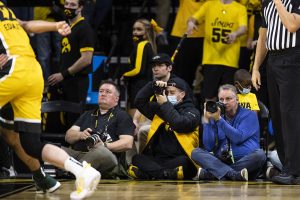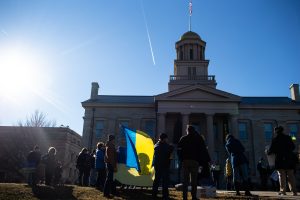UI archivist David McCartney retires after 20 years
One of the University of Iowa’s most prominent archivists, David McCartney is retiring this March. After 21 years of combing through the university’s special collections, McCartney will be remembered by the people he worked with and the community he served.
February 27, 2022
David McCartney holds history in his hands.
The university archivist has combed through the University of Iowa’s Special Collections and University Archives for over two decades, trying to find stories to understand and share.
McCartney said his profession is a family passion.
“My mother is to blame for my historical interest, and my father, too,” he said. “My parents loved history. At one time, my dad, who was a lawyer, thought about going back to graduate school to teach history … he did not pursue that, but he instilled a love for history in me at a young age.”
Archival work is McCartney’s second career. Formerly, he spent 15 years in journalism. After graduating from the University of Wisconsin-Madison in 1979, he went into radio, playing stations in Iowa, Wisconsin, and Alaska.
Then, at 38, McCartney returned to school and earned his master’s in library science and history from the University of Maryland-College Park.
“I think what brought me to [changing careers] was a recognition that earlier in my life, and even in college, I had a very strong interest in public history,” he said. “I didn’t connect the dots until many years later, but better late than never I guess.”
As McCartney moves into retirement, his impact will echo through the aisles of archives on the Main Library’s fourth floor. His friend and coworker, UI Community and Student Life Archivist Aiden Bettine, said he will miss having regular conversations with McCartney.
“One thing I find really beautiful about David is, somehow, he can always find a connection to Charles City, Iowa, which is where he’s from,” Bettine said. “I’m always amazed that he can find a through line to Charles City in so many different people and things that happen. He’s so aware of his local history and it amazes me.”
McCartney has dug into the university’s history and uncovered stories that could have been lost to the passage of time, Bettine said. From protests to the digitization of historical documents, he said McCartney’s work is essential to continuing the documentation of the UI’s 175-year history.
Specifically, McCartney has paved the way for oral history to have a space in the UI’s archives, Bettine said.
“There’s a strong legacy of oral history in the university’s archives and I think David has had a very heavy hand in maintaining that,” he said. “It’s essential because you can’t always have material examples of how history has happened because if someone didn’t know something was important enough to keep, we can still go get those stories, and that’s something David is always up for.”
Over McCartney’s 20 years at the university, Iowa Magazine Editor Shelbi Thomas said he has made history more accessible to the general population and the Hawkeye community.
“He’s knowledgeable and passionate about history and making it accessible to the average person,” she said. “And I think you can see that in a lot of his columns and his virtual course he’s hosting for alumni to celebrate the 175th anniversary. His exhibits also show how he reaches out and is able to share history with new audiences.”
Thomas said McCartney wrote more than 25 columns for the magazine. His final edition of “Old Gold” comes out in March.
RELATED: UI celebrates 175 years of student voice, protest
McCartney has also been essential to finding new materials to add to the archives. Jane Roth, a donor to the UI Libraries, wrote in an email to The Daily Iowan that McCartney made donating 48 original Herky the Hawk drawings to the university simple for her and her mother.
“David has made such a positive difference in setting an outstanding example to the university community and his colleagues in similar positions across the U.S. for the importance of preservation to the university’s legacy to future generations,” Roth wrote. “He is truly an exemplary ambassador for the University of Iowa Libraries and Special Collections.”
Roth added that McCartney has also cared for and preserved the archives she donated, and he serves as a great mentor for younger archivists learning and working at the UI.
“Overall, the University of Iowa community is going to miss a kind gentleman, who is truly a class act,” she wrote.
Bettine said McCartney has an incredible energy when it comes to caring for people’s histories. He said the retiring archivist works to remind people history still matters in the 21st century, by connecting stories to people in the past and present.
“[David] is such a humble and kind person,” Bettine said. “And he is someone who has really been committed to finding the student voice in the university’s archives and the personal voice, whether that’s faculty or staff. He doesn’t work just to read the material; he’s always working to humanize the record.”
McCartney’s work will continue to be essential to the UI’s history, Bettine said, as he’s poured his heart into understanding the stories of various underrepresented populations at the university.
As McCartney retires, he said the university is looking for his replacement to usher in a new generation of history keepers.
McCartney said he looks forward to wrapping up some projects he’s been working on. His final collection for the UI continues until July and showcases the university’s history as it celebrates its 175th anniversary.
McCartney said he was lucky to work at the UI because of the university’s commitment to the written word.
“The university’s commitment to the written word is clear,” he said. “To be an archivist at a university that values that is a very clear privilege and it’s an honor.”
He said he will miss the special-collection team and the Hawkeye community as he moves away from the university in a professional capacity, though he will remain in Iowa City. He said he hopes students will continue to listen to history long after he leaves his archival post, as history can be a source of information and guidance.
“It’s not simply reenacting or remembering the past, but it’s a way for us to make better informed decisions today. I really think history is linked to our future in that regard,” he said. “And if you’re a Hawkeye and you come across a story you find particularly compelling, allow yourself to be enveloped by it and absorb that story. Take from history whatever you can, because it never stops.”







McCartney will retire on March 1, after 21 years at the UI.